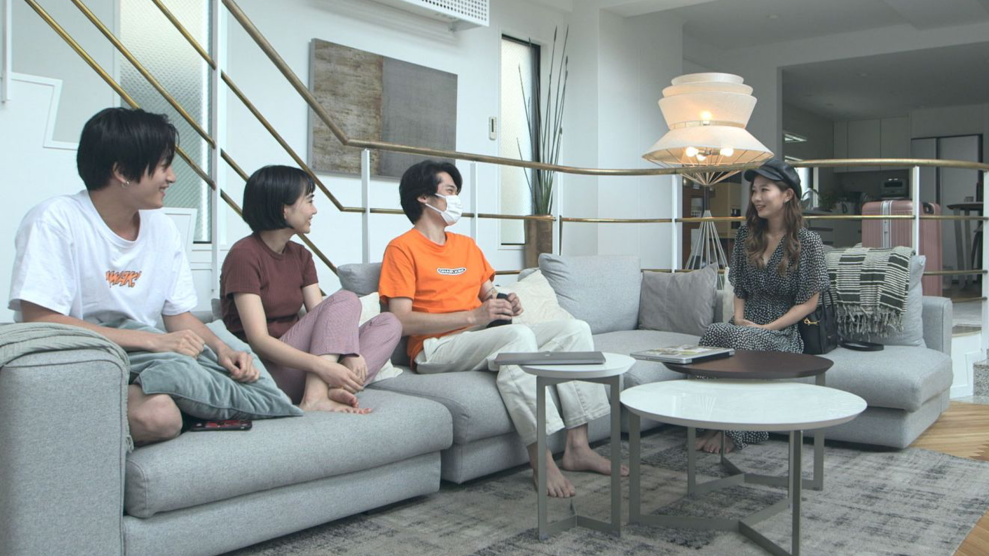
Some of the housemates on 'Terrace House: Tokyo 2019–2020'.Netflix
An occasional series about stuff that’s getting us through a pandemic. More here.
An episode of Netflix’s Japanese reality show Terrace House goes something like this: Ruka gets home from working at a clothing store in Tokyo. He’s greeted by Haruka, who’s cooking ramen on the stove, and soon they’re eating dinner with four housemates who round out the show’s small cast. Like a little brother, Kaori and Haruka tease Ruka for not having decided on a career. They brainstorm ideas based on his passions, then the girls retreat upstairs to thoughtfully discuss their feelings. Risako isn’t sure how to respond to Kenji’s advances. She needs time to get to know him better. As she bites her lip, a pop song crescendoes. This is the Terrace House version of a cliffhanger.
Known as “the reality show where nothing happens,” Terrace House, which released new episodes of its Tokyo 2019-2020 installment last week, is my antidote for a time when too much is happening all at once. Kick back and soak in idyllic scenes from the year 2020 B.C. (Before Corona), when we left the house, sipped boba in parks, and entertained visitors with reckless abandon. The show centers the friendships, crushes, and romances that slowly develop among six housemates, with a level of nuance rarely seen in reality TV. But beyond the narcotic quality of its muted color palette and drama-free plot, Terrace House has brought me something deeper: a reminder that another world is possible.
When the US first came down with the ‘rona, I found strange comfort in watching Tiger King, not despite but because of its insanity. Friends and family joined me in drowning our troubles in the wild machinations of Joe Exotic and Carole Baskin, as memes about them infected our group chats in a manner that could only be called “viral.” The show’s addictive drama gave us something new to talk about: She totally killed her husband, but did she feed him to the tigers? As our president shrugged off the impending tsunami of death and collapse, Tiger King presented us with an alternate train-wreck, one that was actually possible to enjoy. Our national crisis remains uncertain and unending, but the show Doreen St. Félix summed up as “what we watched two weeks into our isolation” concluded after seven densely packed episodes, offering some bizarro form of surrogate catharsis.
It was hardly the first time I found guilty pleasure in a grotesque spectacle. From KFC’s decadent Double Down sandwich to Britney Spears’ sad, sedated dancing at the 2007 VMAs, I’ve long delighted in the “so bad it’s good.” Yet as our reality show president’s body count rises and the spectacle of his gaffes evolves from grotesque to scary, it feels as if there’s enough “bad” afoot to finally seek comfort in the actually comforting. In isolation, I newly appreciate the simple pleasures of being with others, of getting ready with girlfriends on a Saturday night, of the slow burn of a simmering crush who I’m not sure when I’ll see next. Terrace House frames such moments as if they were works of art.
What the show lacks in plot twists it makes up for in taste. Establishing shots are at once oblique and evocative, like video haiku: a train rolling through some trendy part of Tokyo; the full moon cresting a dew-speckled bush; steam rising off a mouth-watering dish before two castmates on a date dig in. Terrace House’s approach to reality TV is open-hearted and understated, with a focus on the familiar dynamics that arise when several people co-habitate. Pivotal scenes often involve one housemate calmly explaining to another how their actions have negatively affected the group, and that person pledging to do better. Every few episodes, someone’s in a sick mask because they have a cold, something Japanese people did to keep germs from spreading long before this plague. As strangers learning to live together, they prioritize the collective over the individual: the opposite of isolation.
So as Tiger King mania begins to fade, I invite you to join me in soothing your shellshock with this mundane yet fulfilling relic from the not-so-distant past. Your patience will pay off when Ruka finally gets his shit together, or when Risako decides, over a five-episode arc, that she’s into Kenji after all. Live vicariously through six people who have no idea what’s coming (and will be more prepared than us Americans when it does). Watching strangers slurp down ramen suddenly feels like medicine—or at least less like empty calories than what we’re usually binging.
#TERRACEHOUSE They were so wrong. pic.twitter.com/Snl1pn4Ogs
— Choco (@Chocolaids) April 10, 2020


















